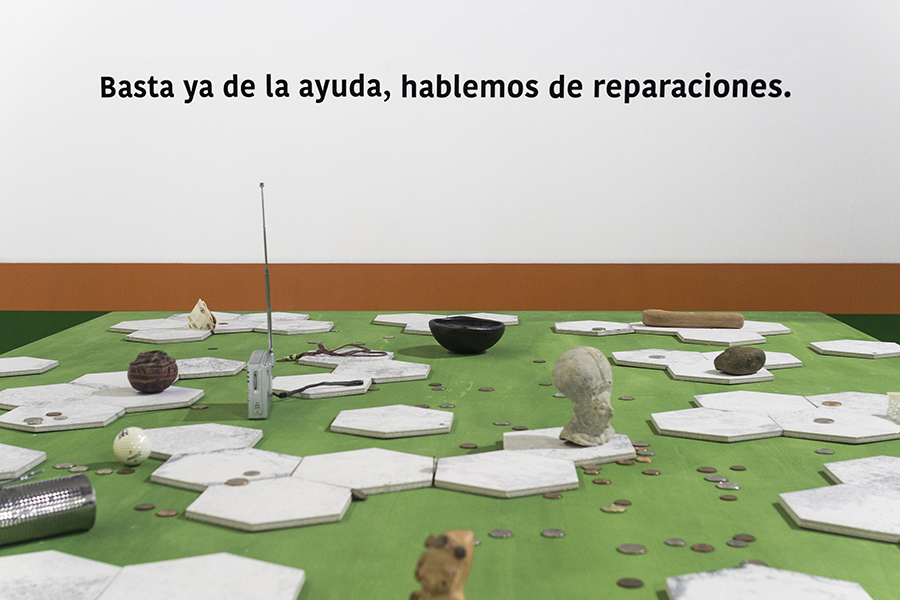Which are the situations of our lives occupied by colonial attitudes? In what degree modernity corresponds to them? How do these two phenomena coexist? Can we conceive them as the two constituent elements of what we call progress, namely, the transformation dynamics that obliterate the processes of destruction generated by themselves? What are the “mythologies” that the media and official discourses create in order to conceal the violence of progress, presenting it as a better reality? How can we verify this process? Can we dig into these situations to detect faults and blind spots, and make them visible?
Believing that art and cultural formation is a matter of sharing experiences and reflections rather than focusing on technics, this workshop proposes to establish a research based, collaborative and collective experience to dive upon subjects related to modernisation and colonisation, as both retain vectors of visual regimes and cultural narratives from the past which still echo in our contemporaneity, as the revival of old-new promises in the reenactments of (neo) colonial populisms.
Following these topics, the aim is to discuss and develop practically – as also in certain degrees, theoretically – upon a rich array of alternatives to the art practice and its related functions and spaces of existence: assuming it as the production of archives (of concepts, tools and commons); as the generation of sites for resistance; as processes linked to the verification of obscure aspects of realities by the employment of fieldwork and research; as a search, recovery and production of knowledge; as alternative forms of undisciplined pedagogy; as a momento to enable a certain type of public forum to debate certain ideas and values; as the gathering of source materials to question history and so on. The path of this experience to be followed will be, somehow, assembled together, a path that will be drawn while it is being followed.
Presentation of my practice, fields of interest and methodologies (examples of projects and works), as well presentation of the hosts and students interests and backgrounds.
- setting the setting, organizing our space in different ways, challenging our bodies (work on the floor for example? organizing the group in circles, which dynamics we will use to exchange and what languages to talk? )
- talking about indicated texts, concepts, ideas, methodologies (creating a common ground)
- discussing some references and proceedings for the next part of the session
Collectively we will start to research and choose some common points (or touchstones) from where to start our work, from where to explore and subvert certain logics, from where to question our reality. For example: we can depart from a public announcement, political speech or even official and historical text that defines notions regarding nation, development, brotherhood, modernisation, exploitation, migration, social welfare, cultural diversity and so on (following topics that may be urgent to the group). We can choose on textual piece, or a arrangement of parts of more than one.
The idea is to define and prepare a broader frame for the tasks that will follow on the second session, which will be based on the idea of ‘in site research and fieldwork’. So we will focus, from this first textual choices, to carry on field works, visits, production of registers and gathering of objects in some situations within the city, such as:
– Histories / museums and archives: to see specific works, as for example to see Animaux, fleurs et fruits, 1717, Huile sur toile, 124 x 231 cm. Alexandre-François DESPORTES [Champigneul-Champagne, 1661 – Paris, 1743] at Grenoble Museum http://www.museedegrenoble.fr/953-le-xviiie.htm;
– Networks / shops, products, places, neighbourhoods: fieldwork on a site (for example Banlieue Villeneuve modernist neighbourhood http://strabic.fr/Grenoble-Villeneuve-Lionel-Catelan);
– Places / situations, bodies and interactions: to research possible networks of development, work, economy and production sites (material and immaterial production) that has as flux or hubs the region or city of Grenoble, exploring issues of labor, economy, cultural clashes or heritage, and related topics (e.g. popular or ethnic markets, transformations in center – old town, former industrial districts being in dispute and similar);
Obs.: None of the examples must be takes as fixed choices, the aim is to trigger already reflection why we are choosing one case instead of another and so on…
The workshop second’s day will be dedicated to carry on the visits, activities and and tasks agreed in the previous session. Tools: Photography, drawing, cartography, diagrams, sound and image recording, collecting of objects and elements with the use of any other medium not listed that might be suitable for the tasks.
The final day will be dedicated to collectively post-process the results and gatherings of information we collected and experienced. The idea is to go deeper in the attempt to question things and making them to somehow ‘talk’ beyond their own nature, to be devices for enquire and reflection as well of a certain kind of expression. With the employment of research and textual production, crossing with possibilites to use appropriative methods (found images, found footage) the idea is to work on and expand the complexity of the experiences we had, creating narrative devices and a performative arena where registers, ideas, texts and matter can collide. With the use of photography (from the proviso day as well done as studio stills in locus), production of texts to be juxtaposed to objects, editing of small pieces of video and sound, interventions on objects, the use of drawing and similar tools, the aim will be to form a sort of small Atlas in which translations, (re)connections, editions, juxtapositions, compositions, assemblages, unifications, collisions, clashes will exist, in order to problematise and reflect about those lived experiences, about the narratives that seems to govern our daily lives. The aim is to experience a process which will enable one to start to see and feel things differently, to always doubt form reality, and then try to see things in a diverse, as also, challenging perspective.
